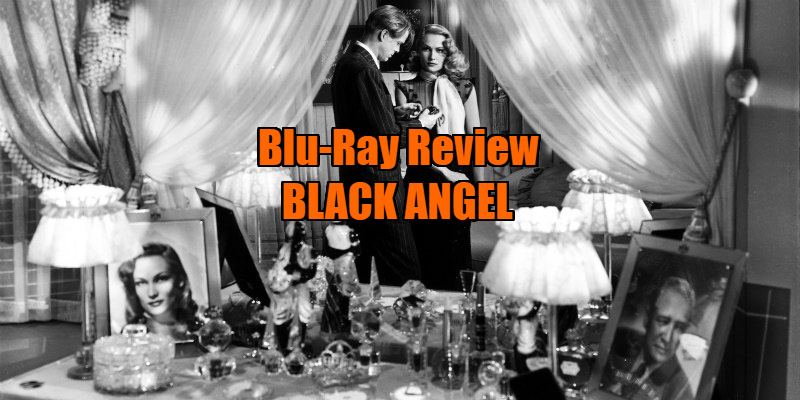
Review by Eric Hillis
Directed by: Roy William Neill
Starring: Dan Duryea, June Vincent, Peter Lorre, Broderick Crawford, Constance Dowling, Wallace Ford

The female leads of the film noir genre were more often than not antagonists, seductive femme fatales out to ruin the lives of the male protagonist. Roy William Neill's 1946 thriller Black Angel belongs to that small subset of noirs that bucked this trend, movies featuring female protagonists working to save the lives of the men they love (see also Robert Siodmak's Phantom Lady and Norman Foster's Woman on the Run).

Neill's film, adapted from Cornell Woolrich's novel, similarly defies convention by casting Dan Duryea in a heroic (well, sort of) role. Best known for essaying a variety of snivelling hoods in films noir and westerns, Duryea is cast against type here as alcoholic songwriter Martin Blair, who arrives at the apartment building of his ex-wife Mavis (Constance Dowling) late one night, sozzled and seeking a scuffle. The building's security guard refuses him entry, and as Martin reluctantly leaves, he witnesses another man gain access to Mavis's apartment.
Later that night, a hammered Martin is collected from a bar by his buddy Joe (Wallace Ford, the Lou Costello to Dick Foran's Bud Abbott in Universal's Mummy sequels), who brings him back to his apartment, where he instantly crashes out on his bed. Meanwhile, another man arrives at Mavis's apartment. Married man Kirk Bennett (John Phillips) has been cheating on his wife with Mavis, and has arrived with the intention of calling the whole affair off. He's surprised to find Mavis has been strangled with her own scarf, and as he's gathering his thoughts, her mystery assailant seems to exit the apartment, snatching a brooch from the corpse's gown. Kirk gives flight, but unluckily for him, he is spotted fleeing the scene and subsequently convicted of Mavis's murder.
[ READ MORE: Blu-Ray Review - Cloak and Dagger (1946) ]
Despite learning of her husband's infidelity, Kirk's wife Catherine (June Vincent) is convinced he couldn't have killed Mavis, and sets out to prove his innocence. Once a singer, Catherine teams up with Martin to form a double act, gaining work at the Rio club, whose owner, Marko (Peter Lorre), is the man Martin saw go up to Mavis's apartment before she was killed. Convinced that the stolen brooch is being kept in the club's safe, Martin and Catherine bide their time, ingratiating themselves with Marko in an attempt to retrieve the evidence they believe will clear Kirk.

Irish born director Neill is best known to classic film fans for helming the bulk of Universal's Basil Rathbone starring Sherlock Holmes series. Neill's shadowy style played an important role in gaining the audience's acceptance when Universal controversially chose to transplant Holmes from his Victorian setting to the contemporary 1940s. A meticulous director of b-movies, Neill's films always looked far more impressive than their modest budgets might usually allow for, and such is the case with Black Angel, his final film. Neill pulls out a few flashy moments, opening with a striking boom shot that ascends from street level, flying towards a high rise apartment window, then zooming through its shutters towards a chandelier hanging in the centre of the soon to be victim's living room. It's the sort of extravagant shot you might expect from an Argento or Antonioni film, rather than a 1940s studio programmer.
[ READ MORE: Blu-Ray Review - Edge of the Axe (1988) ]
What's most striking about Black Angel is how it acknowledges and exploits its Los Angeles setting. Movies of this period usually tended to portray L.A. as an everytown, but Neill's film hones in on its status as the centre of the entertainment industry. While searching for clues, Katharine finds herself in a bar frequented by movie extras, still in costume and enjoying a few sneaky shots on their lunch break. Rather than taking place in shadowy alleys and dimly lit flophouses, Black Angel's action plays out on bright dancefloors and in homely suburban living rooms, and for a brief spell it appears to morph into a musical about two performers falling for one another during the course of their work. Martin's piano playing is even integrated into a suspense sequence when he begins playing Beethoven's Moonlight Sonata to alert Katharine that Marko is headed up to his office, where she is ransacking his wall-safe.

Black Angel has been oddly forgotten and left out of the established noir canon, but Arrow Films' new restoration wipes away the cobwebs to reveal an overlooked gem that, much like the brooch at the centre of its narrative, you'll want to get your hands on if you're a noir completist. Neill's career certainly ended on a fitting high for a filmmaker who rarely receives the recognition he deserves.

Extras:
Feature commentary by film scholar Alan K. Rode; interview with film historian Neil Sinyard; original trailer; image gallery; collector's booklet featuring new writing on the film by author Philip Kemp (first pressing only).

Black Angel is on blu-ray now from Arrow Academy.
"A film deserving of a place in the pantheon of conspiracy thrillers."— 𝕋𝕙𝕖𝕄𝕠𝕧𝕚𝕖𝕎𝕒𝕗𝕗𝕝𝕖𝕣.𝕔𝕠𝕞 🎬 (@themoviewaffler) January 28, 2020
WINTER KILLS is on blu-ray now from Powerhouse.
Read @abbeyjason's reviewhttps://t.co/Hp8jtfj0gJ pic.twitter.com/NPlFiGBU9w
